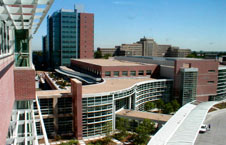 |

University of Colorado Cancer Center
Director: Dr. Paul A. Bunn, Jr. • 1665 N. Ursula Street/PO Box 6510, Aurora, CO 80045 • Phone: 800-473-2288 • Web site: http://www.uccc.info
 Background
Background
In March 1988, the University of Colorado Cancer Center (UCCC) became the only NCI-designated Cancer Center in the Rocky Mountain region, receiving Comprehensive Cancer Center status in November 1997. In 2000, the outpatient care of UCCC moved from its original campus near downtown Denver to the new University of Colorado at Denver and Health Sciences Center campus (UCDHSC), a "health sciences city" that is being built at the previous Fitzsimons Army base in Aurora, Colorado. A 12-story, 640,600-square-foot cancer research facility opened across the street from the outpatient cancer unit in 2004, helping clinical and basic researchers to collaborate. Recently, UCDHSC formalized a consortium agreement with several partner institutions in Colorado, which both strengthened and broadened the scope of cancer research activities, and extended the benefits of that research to a wider population.
Patient Care
The Developmental Therapeutics/Phase I Program, which started at UCCC 7 years ago and has enrolled more than 600 patients, is one of 16 NCI-funded phase I programs and the only such program in the Rocky Mountain region. The program draws patients from more than nine states. Other features of it include a 3-year Developmental Therapeutics Fellowship Training Program and a translational lab.
The Melanoma Research Clinic at UCCC is one of the largest in the nation, and is staffed by medical oncologists and oncology nurses who specialize in melanoma, dermatologists with particular expertise in pigmented lesions, dermatopathologists, dermatologic surgeons, and surgical oncologists.
UCCC is internationally recognized for work on the prevention, early detection, and treatment of lung and chest cancer, and is a Lung Specialized Program of Research Excellence (SPORE). Within the SPORE are four scientific projects studying the role of altered signal pathways in the pathogenesis and progression of lung cancer, and learning to use these alterations as biomarkers for risk, as well as for developing and evaluating new chemoprevention and treatment strategies.
Research Activities
UCCC is becoming a national leader in structural biology, providing expertise and state-of-the-art nuclear magnetic resonance instrumentation and x-ray crystallography. Recent pioneering studies of chromosomes, chromatin, and gene regulatory complexes represent important strides toward understanding key components of gene expression and cell-growth regulation pathways that may be targeted in future cancer therapies.
Other Notable Programs
UCCC was recently awarded a $3 million grant to provide colon cancer screenings for uninsured legal residents of Colorado to implement and manage the Colorado Colorectal Screening Program. The program began in January 2006 in community clinics in northeastern Colorado, at Denver Health Hospital, and in the city of Pueblo, and has already screened more than 600 patients, found 5 cancers, and prevented an estimated 12 cancers through the removal of large polyps.
UCCC recently became a member of the LIVESTRONG Survivorship Center of Excellence Network. The program provides resources, support, and information to cancer survivors in Colorado and the Rocky Mountain region, and will conduct research to improve follow-up and care of cancer survivors.
|